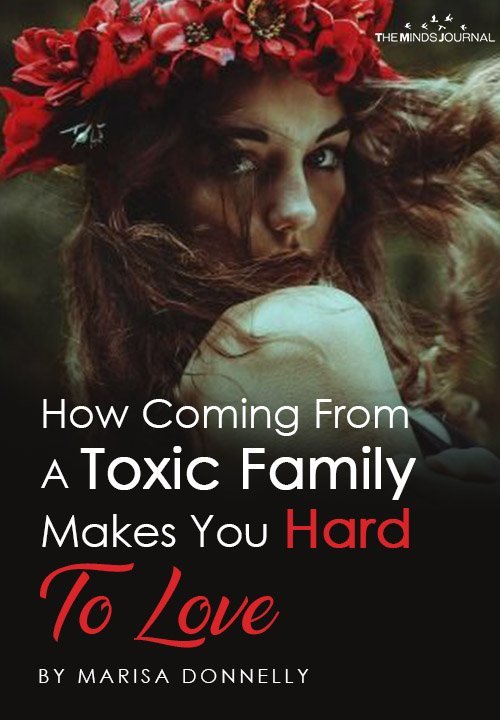Anyone coming from a toxic family carries a lot of emotional baggage and heartbreak. Coming from a toxic family means harboring a lot of painful feelings in your heart, and not always knowing how to deal with them.
When you come from a toxic family, your way of seeing the world is often skewed.
Love and relationships, to you, are painful and difficult. Rather than seeing connections with others as positive, or as means of growing you as a person, you often feel manipulated or controlled.
Instead of wanting to open yourself to the potential of a real relationship, you tend to hold back, fearing commitment and scared to truly let go. Not only is loving hard for you, but oftentimes it becomes difficult for others to really support and care for you, too.
Related: 10 Signs of Toxic Family Enmeshment and How It May Impact You As An Adult
Here’s how coming from a toxic family makes you hard to love, and ways you can learn to open yourself a little more.
1. You’re often guarded and afraid to let others in.
Your toxic family has negatively shaped the way you view relationships.
Because you’ve been hurt so many times by the people closest to you, you’re guarded. You don’t want to let people in because you’re tired of being disappointed and hurt.
Opening up seems like a chore and one where the risk doesn’t outweigh the reward. Although you want to let others in, you either feel like you can’t because of your past, or you’ve completely forgotten how because of the walls you’ve built.
2. You’re hesitant when it comes to giving someone your heart.
You’re hesitant when it comes to anything with your heart.
You’ve built protective walls and barriers to keep people as far from you as you possibly can—life feels safer that way.
Giving someone your heart sounds beautiful but requires vulnerability that you’re not willing to have yet. Your toxic family has taught you that when you’re vulnerable, you get hurt, and the fear you have outweighs your willingness to even try.
3. You tend to assume the worst when it comes to people and situations.
You’ve learned to not expect too much from people because they often leave you disappointed or hurt. Because of your family experiences, you tend to assume the worst. This keeps you from really getting close to people or taking chances on relationships.
4. You’re unwilling to really trust.
Trust isn’t something you freely give.
After all, the closest people to you have betrayed you time and time again. Even if you’re faced with a genuine person who proves his or her loyalty, you’re still unwilling to return that trust.
5. You often make knee-jerk decisions, or react in the moment rather than thinking things through.
Because of your toxic family, you often react in-the-moment.
If something upsets you, you express this—often negatively. If there’s any sign of trouble, you have the tendency to balk or run. This leaves you from actually getting through tough moments and makes people feel as if you’re flighty or inconsistent.

How you can open yourself to love a little more when you’re dealing with a toxic family environment
Coming from a toxic family can create barriers in the way you build connections and relationships with others.
Although you’ve been through a difficult or tumultuous past, you can’t let that negativity shape the new relationships in your life.
In order to open yourself up, you must understand that every person is different. Just because someone close to you hurt you in the past doesn’t mean the new person in your life will. Just because you’ve been heartbroken before doesn’t make falling in love again any less worth it.
Related: 5 Helpful Tips To Deal With Toxic Family And Save Yourself
Practice being vulnerable in small segments. Share one secret and let this naturally build into more and deeper things. Show up for people and listen when they share something with you. And above all, understand that healing takes time.
You are not your toxic family, and you will move on and find loving, nurturing relationships despite what happened to you.











Leave a Reply